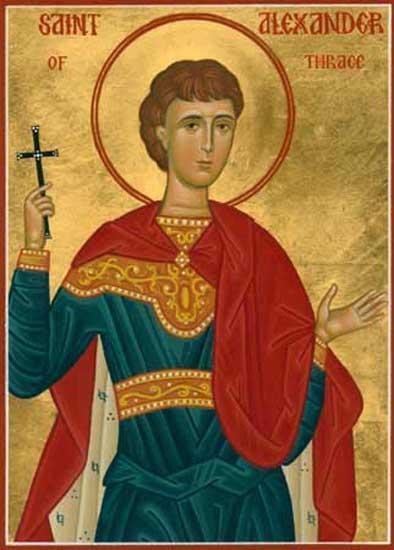Martyr Alexander and Virginmartyr Antonina at Constantinople
The Holy Martyrs Antonina the Virgin and Alexander. Saint Antonina was from the city of Krodamos (Asia Minor). She was arrested for being a Christian, and was brought before the governor Festus.
He urged her to worship the pagan gods, promising to make her a priestess of the goddess Artemis. But the saint bravely confessed Christ, and she urged the governor to renounce the worship of demons in the form of idols. Festus gave orders to strike the saint on the face and lock her up in prison.
The martyr spent all her time at prayer, she ate and drank nothing, but then she heard the voice of God, “Antonina, fortify yourself with food and be brave, for I am with you.” When they led her before the governor again, the martyr continued to stand up for the Christian Faith and to denounce the pagans.
The governor decided to give the holy virgin over for defilement by soldiers, but the Lord inspired one of them, Saint Alexander, to save the holy virgin. He sought permission to go in to her on the pretext that he might be able to convince her to obey the governor’s will. Saint Alexander then suggested that she put on his military attire and flee. Saint Antonina was afraid, but the Lord ordered her to agree.
No one recognized her dressed as a soldier, and she walked out of prison. The soldiers sent by Festus found Saint Alexander alone in the cell. He would not respond to the questions of the governor, and so he was tortured and mercilessly beaten. Through the inspiration of the Lord Jesus Christ, Saint Antonina also came to stand before Festus.
Soldiers cut off their hands, then they smeared them with pitch and threw them into a pit where a fire was burning. When the fire went out, they threw snakes into the pit, so that Christians would not be able to gather up the bones of the martyrs. Returning home, Festus became numb, and was able neither to eat nor to drink. He died after seven days of terrible torment.
Sts Alexander and Antonina were martyred on May 3, 313. In the Prologue their memory is listed under June 10. The relics of the saints were transferred to Constantinople and placed in the Maximov monastery.
Hieromartyr Timothy the Bishop of Prusa
The Hieromartyr Timothy, Bishop of Prusa (Bithynia), received from the Lord the gift of wonderworking because of his purity and sanctity of life. At Prusa he converted many pagans to the faith in Christ.
The emperor Julian the Apostate (361-363), upon hearing about Saint Timothy had him locked up in prison, but even there also the saint continued to preach the Gospel. Julian forbade him to teach about Jesus Christ, but the saint continued to spread the Christian Faith. Finally, the emperor gave orders to behead the saint. His holy relics were afterwards transferred to Constantinople.
Synaxis of All Saints of Romania
On the second Sunday after Pentecost, each local Orthodox Church commemorates all the saints, known and unknown, who have shone forth in its territory. Accordingly, the Orthodox Church in Romania remembers the saints of Romania on this day.
“All Saints Sunday is a sanctioned historical presence, namely it got into the conscience of the Church as far back as the 4th century, first in the Eastern Church and then took over in the West too. Saint Basil the Great confesses in one of the prayers of his Liturgy that God wonderfully works through the saints that pleased him of any nation, showing that they represent every national Church and people. So, it was necessary that this feast should be established due to the presence and acknowledgement of the holiness of all categories, either confessors or pious saints of our nation”, says Rev. Prof. Sorin Cojocaru from the Orthodox Theological Seminary of Saint Andrew the Apostle of Galati city.
The Romanian saints are the most precious fruit of the work of the Holy Spirit in Romania.
On Romanian Saints Sunday the Romanian Church remembers the martyrs, confessors, hierarchs and pious, theologians and hermits, known and unknown, canonised or not, that the territory of Romania created.
Source: basilica.ro
